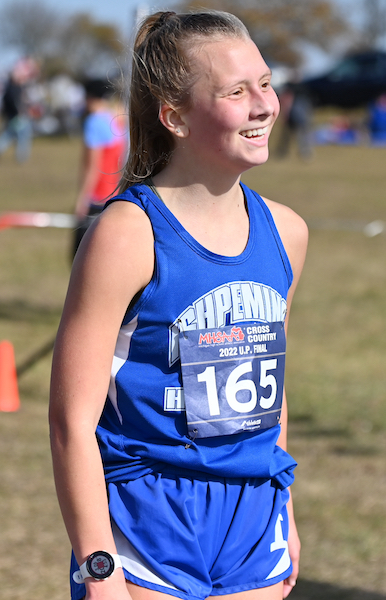
Marlette Racer Heats Up with Cold Weather
By
Paul Costanzo
Special for MHSAA.com
October 23, 2019
Temperatures near the Lake Huron shore will hover around 40 degrees Saturday morning when the girls Division 4 Regional cross country meet begins at Wagener Park.
 Riley Ford wouldn’t have it any other way.
Riley Ford wouldn’t have it any other way.
“I’m more of a summer person, but in regard to running, I like the cooler weather,” the Marlette senior said. “I perform a lot better in the cold. I don’t get as overheated. I love the cold – when your legs are almost numb because it’s so cold – I love that feeling.”
Ford will compete for a second straight Regional championship, the next step toward what could be a third straight all-state honor. More importantly, however, she wants to get back down to the times she was running a year ago, and the cold weather could play a major role in that. Not just because of her preference, but because of her health.
During the 2019 track season, Ford was diagnosed with asthma, which was brought on by a tree pollen allergy – something that flares up during the warmer months. While she’s dealt with it admirably, setting school records in the 800, 1,600 and 3,200 meters in track, and winning five of her 10 cross country races this season, she knows she hasn’t been at her best.
“I’ve tried to stay positive,” Ford said. “I went on a college visit and was talking to one of the girls who also had asthma, and she said, ‘It’s OK. Sometimes you’re not going to be able to finish every workout.’ I’ve been realizing that some of it is beyond my control. It’s been very frustrating. Super, super frustrating. But I keep going back every Monday after a race and trying to get better.”
Initially, Ford thought she was dealing with a cold, but it wouldn’t go away. She began audibly wheezing during races, something Marlette coach Chris Titus – who is also Ford’s uncle – noticed as strange, as his star runner was known for her incredible endurance.
She ran her best 1,600 (5 minutes, 16.59 seconds) and 3,200 (11:28.77) times in early May. She qualified for the MHSAA Finals in both events, as well as in the 800, and finished eighth in the 1,600. But her times in the longer distances weren’t challenging her own personal bests.
“She had set the school record in the mile, two mile and half mile, and everything was going really good,” Titus said. “We got to late May, and we started to notice this wheezing problem. By the time we got to June, she was in trouble.”
Ford also was very aware that something was off.
“I kind of noticed that my lungs were starting to feel heavy,” she said. “I knew I was in good shape in the track season, because it was the first year I had upped my training. I knew it was something else. It was not really an out-of-shape feeling.”
She cut back some of her training during the summer as she dealt with her new condition, and now runs with an inhaler.
Despite all of that, her season-best time of 19:03.3 ranks fourth in Division 4. She finished fifth in the division a year ago at the MHSAA Finals, and was 22nd in Division 3 as a sophomore.
Ford, who has a personal best of 18:49 and broke the 19-minute mark three times as a junior, knows there are better times ahead of her, and she’s hoping to start posting them Saturday.
“I’m not really just looking to win,” she said. “I’m hoping to run under 19 – I did it last year. Not only do I want to win it and get points for my team, but I want to drop my time to go into states with some momentum.”
Her season goal is very much the same, as she said she hopes to finish strong and giver herself some confidence and momentum heading into the preparation for her senior track season and beyond. Ford plans to run collegiately and has narrowed her choices to two schools: Huntington University in Indiana and Dalton State College in Georgia.
No matter how things finish, Ford already has taken her place as the top female distance runner in Marlette history, as not only does she hold the three track records, but also has the school’s best cross country time.
“She’s had a great career,” Titus said. “Every single year, she has excelled and improved. I’ve had some very good girls runners, and she’s darn close to a minute faster than anybody I’ve ever had. A lot of those (records) are going to be there for a while. She’s drove them down to the point that she’s likely going to keep those for a while.”
That praise isn’t lost on Ford.
“It makes me feel really good knowing how much time, effort, blood, sweat and tears I put into this,” she said. “It means a lot to me. There are tons of runners that he’s coached. To stack up with (the best) is just insane.”
 Paul Costanzo served as a sportswriter at The Port Huron Times Herald from 2006-15, including three years as lead sportswriter, and prior to that as sports editor at the Hillsdale Daily News from 2005-06. He can be reached at [email protected] with story ideas for Genesee, Lapeer, St. Clair, Sanilac, Huron, Tuscola, Saginaw, Bay, Arenac, Midland and Gladwin counties.
Paul Costanzo served as a sportswriter at The Port Huron Times Herald from 2006-15, including three years as lead sportswriter, and prior to that as sports editor at the Hillsdale Daily News from 2005-06. He can be reached at [email protected] with story ideas for Genesee, Lapeer, St. Clair, Sanilac, Huron, Tuscola, Saginaw, Bay, Arenac, Midland and Gladwin counties.
PHOTO: Marlette’s Riley Ford charges ahead during a race this fall. (Photo courtesy of the Marlette girls cross country program.)

Hancock, Munising Reign Again, While Marquette Wins Matchup of Rivals
By
John Vrancic
Special for MHSAA.com
October 22, 2022
FLAT ROCK — There was a feeling the race for the Upper Peninsula Division 1 girls championship would be a close one here Saturday.
That’s exactly how it played out as Marquette edged two-time reigning champion Houghton 35-37. Third-place Sault Ste. Marie scored 104 points.
“The girls did fantastic,” said Marquette coach Derek Marr. “I’m impressed with the way they came through. We were down slightly after two miles, then they really picked it up. I applaud the Houghton girls for their effort. They really went after it.”
Houghton freshman Tessa Rautiola won the 3.1-mile race in 20 minutes, 11 hundredths of a second. She was followed by Sault senior Cassandra Gallagher (20:07.7) and Marquette freshman Ella Fure (20:13.69).
“I just wanted to enjoy the last race of the season,” said Rautiola. “I’m happy with how everything went. We’re pretty happy with our performance. I think this will just make us work harder next year.”
 Gallagher achieved a personal record by one second.
Gallagher achieved a personal record by one second.
“I’m very happy with that,” she said. “I’m also happy with how our team did. I didn’t want to go out too hard today. I was in 10th place at the mile mark. This was my last high school cross country race and I really wanted to give it my all. I tried to catch Tessa, but she ran a real good race. We had nice weather. There were a lot of hills out there, but I liked the course.”
Fure said this was a learning experience for her.
“I learned to work with our team and trust in myself,” she added. “I tried to spread out my energy, which takes a lot of practice. My pacing didn’t go as well in the past. We had been running on flatter courses the last couple weeks to save it for the Finals. We had a few hills out there today, and I had to get used to that all over again. I appreciate all the support I received from our team and coaches.”
Marquette placed the third, fourth, seventh, 10th and 13th placers to edge Houghton, which had finishers in first, fifth, eighth, 11th and 14th. Sophomore Monet Argeropoulos followed Fure in fourth, with junior Abby Harma crossing the line seventh for Marquette. Sophomore Lily Ross was fifth for Houghton, and junior Ayla Miller was eighth.
Division 2
Hancock repeated as Division 2 champion with 23 points, followed by Ishpeming with 40 and Powers North Central at 68.
Ishpeming junior Lola Korpi retained her individual title in 20:18.81, followed by Manistique freshman Maya Carlson (21:26.38) and Bessemer (Gogebic) senior Natalie Stone (21:31.6).
 “That’s awesome,” said Korpi, who had been battling a chest cold. “I was going for time. I’m still battling a chest cold and struggled a little with my breathing.
“That’s awesome,” said Korpi, who had been battling a chest cold. “I was going for time. I’m still battling a chest cold and struggled a little with my breathing.
“We had a full team for the first time this year. I’m so happy the girls decided to run. Hancock was tough to beat. There was a little more pressure trying to defend my title, but it’s really nice to bring something back to our school.”
Carlson was also happy with the way everything fell into place.
“We had only four runners today, but still did good as a team,” she said. “I thought I had a chance to win it, but then I just wanted to stay in second place and finish with her (Stone). I think this was my best race of the year. I got stronger as the race went on. I did some races during the summer, and that helped a lot.”
Hancock surged on the strength of four top-10 individual placers – sophomore Ella Keranen in fifth, senior Maylie Kilpela in sixth, sophomore Rayna Towles in seventh and senior Liana Berg in ninth.
Division 3
Munising captured its third consecutive title with 26 points, followed by Eben Junction Superior Central at 71 and Stephenson with 97.
“We knew what we wanted to do this season and came out of here with a huge win,” said Munising coach Mark Kinnunen. “This just shows what hard work and leadership can do for you, and our senior leadership was as strong as it ever was.
 “Competing with Superior Central is awesome. It’s fun having the two schools do so well. We went from having just one runner to earning three straight U.P. titles. I ran for Fran (former coach DesArmo) and learned a lot from him. It’s an exciting time to be coaching this team.”
“Competing with Superior Central is awesome. It’s fun having the two schools do so well. We went from having just one runner to earning three straight U.P. titles. I ran for Fran (former coach DesArmo) and learned a lot from him. It’s an exciting time to be coaching this team.”
Newberry freshman Samantha Taylor earned the top individual honor in 20:06.34, and junior teammate and 2021 champion Kaylen Clark was runner-up in a season-best 20:18.09.
“I’m obviously disappointed I didn’t win, but happy for Sam. She had an amazing season,” said Clark. I’m happy with the progress I made this year. We should be able to compete as a team next year, which will make it more fun. I gave it everything I had. I plan on training real hard. This just makes me hungrier for it.”
Munising senior Monique Brisson placed third (21:36.09), followed by classmate Hattie Cota (21:54.33).
“I think it’s pretty cool the two Alger County schools finished on top,” Brisson said. “We know each other pretty well. I’m proud of our team and definitely happy for them. It’s a pretty hard course, but I’m obviously capable of better. I’m happy for Hattie. She finished strong.”
PHOTOS (Top) Houghton's freshman Tessa Rautiola (47) and sophomore teammate Lily Ross (48), and Marquette freshman Ella Fure (83) and sophomore Monet Argeropoulos (81) run together during the Division 1 race. (2) Ishpeming's Lola Korpi smiles after she finishes the Division 2 Final. (3) Hancock's Ella Keranen (138), Rayna Towles (143), and Maylie Kilpela (140) run together during the Division 2 Final. (4) Competitors break away from the start during the Division 3 Final. (Photos by Cara Kamps.)

